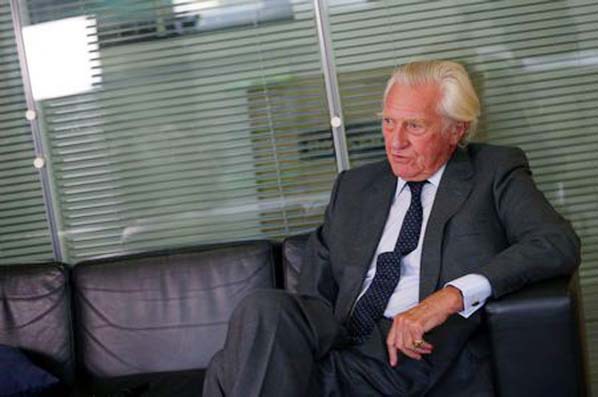
Reuters, London :
Brexit could be reversed if economic pain prompts a change in public opinion that brings a new generation of political leaders to power in Britain, former Conservative minister Michael Heseltine said.
Heseltine, who helped topple Margaret Thatcher in 1990 but ultimately failed to win the top job, said that Britain could face another election in just two years and that Prime Minister Theresa May would not lead the party into that election.
A supporter of EU membership, Heseltine said he saw a scenario in which Britain would not leave the European Union as scheduled in late March 2019.
“There is now a possibility that Brexit will not happen, but it will need a change in public opinion,” Heseltine, 84, told Reuters in an interview. “There may be indications but there is no really substantive evidence of public opinion moving but I think that it will happen. My guess is that public opinion will move,” he said. Heseltine said the shift in Brexit policy by the opposition Labour Party – including staying in the European single market and customs union for a transitional period – indicated Labour had sensed the wind of a change in public opinion.
May, who quietly opposed Brexit ahead of the referendum, has formally notified the bloc of Britain’s intention to leave and divorce talks are under way.
Some European leaders have suggested Britain could change its mind, while former Conservative prime minister John Major has said there is a credible case for giving Britons a second vote on the Brexit deal.
His successor, Labour’s Tony Blair, has said repeatedly that Brexit can and should be stopped. In the June 2016 referendum voters in the United Kingdom backed leaving the EU by a margin of 51.9 percent to 48.1 percent. The world’s fifth-biggest economy initially withstood the shock of the Brexit vote, but growth began to slow sharply this year as inflation rose on the falling value of the pound and hit households. May, who has insisted that Britain will leave the European Union, said last month that she wanted to fight the next parliamentary election, not due until 2022.
Heseltine, though, said that seemed unlikely given her botched gamble on a snap election in June which lost her party its majority in the lower house of parliament.
Brexit could be reversed if economic pain prompts a change in public opinion that brings a new generation of political leaders to power in Britain, former Conservative minister Michael Heseltine said.
Heseltine, who helped topple Margaret Thatcher in 1990 but ultimately failed to win the top job, said that Britain could face another election in just two years and that Prime Minister Theresa May would not lead the party into that election.
A supporter of EU membership, Heseltine said he saw a scenario in which Britain would not leave the European Union as scheduled in late March 2019.
“There is now a possibility that Brexit will not happen, but it will need a change in public opinion,” Heseltine, 84, told Reuters in an interview. “There may be indications but there is no really substantive evidence of public opinion moving but I think that it will happen. My guess is that public opinion will move,” he said. Heseltine said the shift in Brexit policy by the opposition Labour Party – including staying in the European single market and customs union for a transitional period – indicated Labour had sensed the wind of a change in public opinion.
May, who quietly opposed Brexit ahead of the referendum, has formally notified the bloc of Britain’s intention to leave and divorce talks are under way.
Some European leaders have suggested Britain could change its mind, while former Conservative prime minister John Major has said there is a credible case for giving Britons a second vote on the Brexit deal.
His successor, Labour’s Tony Blair, has said repeatedly that Brexit can and should be stopped. In the June 2016 referendum voters in the United Kingdom backed leaving the EU by a margin of 51.9 percent to 48.1 percent. The world’s fifth-biggest economy initially withstood the shock of the Brexit vote, but growth began to slow sharply this year as inflation rose on the falling value of the pound and hit households. May, who has insisted that Britain will leave the European Union, said last month that she wanted to fight the next parliamentary election, not due until 2022.
Heseltine, though, said that seemed unlikely given her botched gamble on a snap election in June which lost her party its majority in the lower house of parliament.

